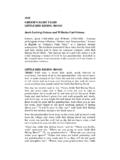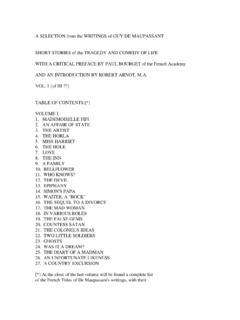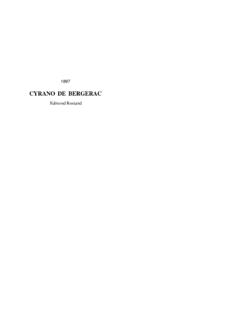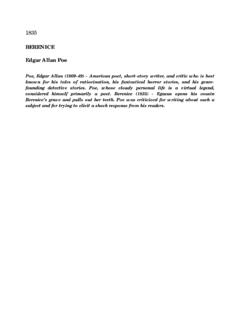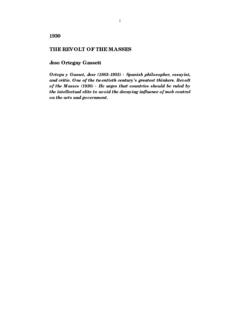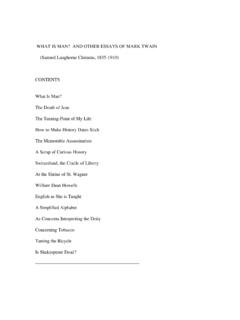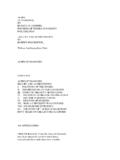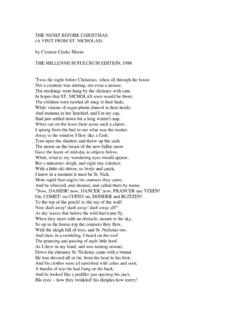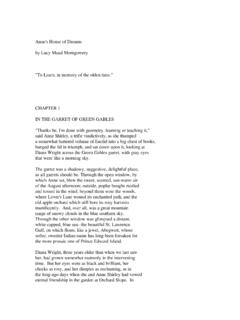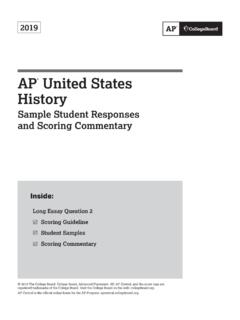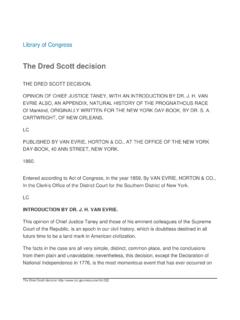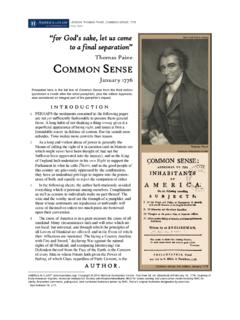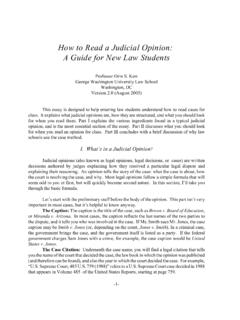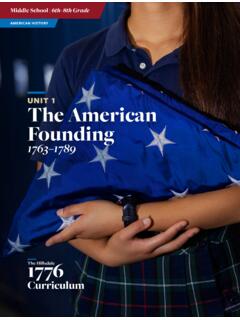Transcription of 1776 COMMON SENSE Thomas Paine ( February 14, 1776 )
1 1776 COMMON SENSET homas Paine ( February 14, 1776 ) Paine , Thomas (1737-1809) - An Englishman who came to Americain 1774, he was a political philosopher who promoted changethrough revolution rather than reform. Paine is most renowned forhis activities advocating democracy. COMMON SENSE ( 1776 ) - Thiswidely-read pamphlet argued for America s immediate separationfrom England. It is considered by many to be the catalyst thatroused public feeling and was most influential in the creation ofthe Declaration of OF CONTENTSINTRODUCTION .. 3 CHAPTER 1 .. 4OF THE ORIGIN AND DESIGN OF GOVERNMENT INGENERAL.
2 WITH CONCISE REMARKS ON THE ENGLISHCONSTITUTION.. 4 CHAPTER 2 .. 9OF MONARCHY AND HEREDITARY SUCCESSION .. 9 CHAPTER 3 .. 17 THOUGHTS OF THE PRESENT STATE OF AMERICAN AFFAIRS.. 17 CHAPTER 4 .. 31OF THE PRESENT ABILITY OF AMERICA, WITH SOMEMISCELLANEOUS REFLECTIONS .. 31 APPENDIX .. 40 EPISTLE TO QUAKERS .. 47 INTRODUCTIONPERHAPS the sentiments contained in the following pages, are notyet sufficiently fashionable to procure them general favor; a longhabit of not thinking a thing wrong, gives it a superficialappearance of being right, and raises at first a formidable outcry indefence of custom.
3 But tumult soon subsides. Time makes moreconverts than a long and violent abuse of power is generally the means ofcalling the right of it in question, (and in matters too which mightnever have been thought of, had not the sufferers been aggravatedinto the inquiry,) and as the king of England hath undertaken inhis own right, to support the parliament in what he calls theirs, andas the good people of this country are grievously oppressed by thecombination, they have an undoubted privilege to inquire into thepretensions of both, and equally to reject the usurpations of the following sheets, the author hath studiously avoided everything which is personal among ourselves.
4 Compliments as well ascensure to individuals make no part thereof. The wise and theworthy need not the triumph of a pamphlet; and those whosesentiments are injudicious or unfriendly, will cease of themselves,unless too much pains is bestowed upon their cause of America is, in a great measure, the cause of allmankind. Many circumstances have, and will arise, which are notlocal, but universal, and through which the principles of all loversof mankind are affected, and in the event of which, their affectionsare interested. The laying a country desolate with fire and sword,declaring war against the natural rights of all mankind, andextirpating the defenders thereof from the face of the earth, is theconcern of every man to whom nature hath given the power offeeling; of which class, regardless of party censure, is THEAUTHOR.
5 - Philadelphia, Feb. 14, 1OF THE ORIGIN AND DESIGN OF GOVERNMENT INGENERAL. WITH CONCISE REMARKS ON THE writers have so confounded society with government, as toleave little or no distinction between them; whereas they are notonly different, but have different origins. Society is produced byour wants, and government by our wickedness; the formerpromotes our happiness positively by uniting our affections, thelatter negatively by restraining our vices. The one encouragesintercourse, the other creates distinctions. The first is a patron, thelast a in every state is a blessing, but government even in its beststate is but a necessary evil in its worst state an intolerable one; forwhen we suffer, or are exposed to the same miseries by agovernment, which we might expect in a country withoutgovernment, our calamities is heightened by reflecting that wefurnish the means by which we suffer!
6 Government, like dress, isthe badge of lost innocence; the palaces of kings are built on theruins of the bowers of paradise. For were the impulses ofconscience clear, uniform, and irresistibly obeyed, man wouldneed no other lawgiver; but that not being the case, he finds itnecessary to surrender up a part of his property to furnish meansfor the protection of the rest; and this he is induced to do by thesame prudence which in every other case advises him out of twoevils to choose the least. Wherefore, security being the true designand end of government, it unanswerably follows that whateverform thereof appears most likely to ensure it to us, with the leastexpense and greatest benefit, is preferable to all order to gain a clear and just idea of the design and end ofgovernment, let us suppose a small number of persons settled insome sequestered part of the earth, unconnected with the rest, theywill then represent the first peopling of any country, or of theworld.
7 In this state of natural liberty, society will be their firstthought. A thousand motives will excite them thereto, the strengthof one man is so unequal to his wants, and his mind so unfitted forperpetual solitude, that he is soon obliged to seek assistance andrelief of another, who in his turn requires the same. Four or fiveunited would be able to raise a tolerable dwelling in the midst of awilderness, but one man might labor out the COMMON period of lifewithout accomplishing any thing; when he had felled his timber hecould not remove it, nor erect it after it was removed; hunger in themean time would urge him from his work, and every differentwant call him a different way.
8 Disease, nay even misfortune wouldbe death, for though neither might be mortal, yet either woulddisable him from living, and reduce him to a state in which hemight rather be said to perish than to necessity, like a gravitating power, would soon form ournewly arrived emigrants into society, the reciprocal blessings ofwhich, would supersede, and render the obligations of law andgovernment unnecessary while they remained perfectly just to eachother; but as nothing but heaven is impregnable to vice, it willunavoidably happen, that in proportion as they surmount the firstdifficulties of emigration, which bound them together in a commoncause, they will begin to relax in their duty and attachment to eachother; and this remissness, will point out the necessity, ofestablishing some form of government to supply the defect ofmoral convenient tree will afford them a State-House, under thebranches of which, the whole colony may assemble to deliberate onpublic matters.
9 It is more than probable that their first laws willhave the title only of Regulations, and be enforced by no otherpenalty than public disesteem. In this first parliament every man,by natural right will have a as the colony increases, the public concerns will increaselikewise, and the distance at which the members may be separated,will render it too inconvenient for all of them to meet on everyoccasion as at first, when their number was small, their habitationsnear, and the public concerns few and trifling. This will point outthe convenience of their consenting to leave the legislative part tobe managed by a select number chosen from the whole body, whoare supposed to have the same concerns at stake which those havewho appointed them, and who will act in the same manner as thewhole body would act were they present.
10 If the colony continueincreasing, it will become necessary to augment the number of therepresentatives, and that the interest of every part of the colonymay be attended to, it will be found best to divide the whole intoconvenient parts, each part sending its proper number; and that theelected might never form to themselves an interest separate fromthe electors, prudence will point out the propriety of havingelections often; because as the elected might by that means returnand mix again with the general body of the electors in a fewmonths, their fidelity to the public will be secured by the prudentreflection of not making a rod for themselves.
